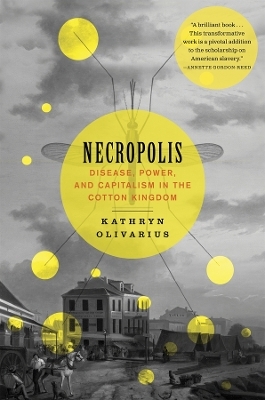
Necropolis
Disease, Power, and Capitalism in the Cotton Kingdom
Seiten
2024
Harvard University Press (Verlag)
978-0-674-29555-1 (ISBN)
Harvard University Press (Verlag)
978-0-674-29555-1 (ISBN)
In antebellum New Orleans, whites and Blacks died in droves from yellow fever. But the fortunes of survivors were less equal. Kathryn Olivarius explores the resulting framework of “immunocapital.” For whites, immunity signaled creditworthiness. For enslaved Blacks, immunity enhanced their exploitability, relegating them to the harshest labor.
Winner of the Frederick Jackson Turner Award
Winner of James H. Broussard Best First Book Prize, SHEAR
Winner of the Kemper and Leila Williams Prize in Louisiana History
Winner of the Humanities Book of the Year Award, Louisiana Endowment for the Humanities
“A brilliant book…This transformative work is a pivotal addition to the scholarship on American slavery.”
—Annette Gordon-Reed
“A stunning account of ‘high-risk, high-reward’ profiteering in the yellow fever–ridden Crescent City…a world in which a deadly virus altered every aspect of a brutal social system, exacerbating savage inequalities of enslavement, race, and class.”
—John Fabian Witt, author of American Contagions
“Olivarius’s new perspectives on yellow fever, immunocapitalism, and the politics of acclimation…will influence a generation of scholars to come on the intersections of racism, slavery, and public health.”
—The Lancet
In antebellum New Orleans, at the heart of America’s slave and cotton kingdoms, epidemics of yellow fever killed as many as 150,000 people. With little understanding of the origins of the illness—and meager public health infrastructure—one’s only hope if infected was to survive, providing the lucky few with a mysterious form of immunity. Repeated epidemics bolstered New Orleans’s strict racial hierarchy by introducing another hierarchy, a form of “immunocapital,” as white survivors leveraged their immunity to pursue economic and political advancement while enslaved Blacks were relegated to the most grueling labor.
The question of health—who has it, who doesn’t, and why—is always in part political. Necropolis shows how powerful nineteenth-century Orleanians constructed a society that capitalized on mortal risk and benefited from the chaos that ensued.
Winner of the Frederick Jackson Turner Award
Winner of James H. Broussard Best First Book Prize, SHEAR
Winner of the Kemper and Leila Williams Prize in Louisiana History
Winner of the Humanities Book of the Year Award, Louisiana Endowment for the Humanities
“A brilliant book…This transformative work is a pivotal addition to the scholarship on American slavery.”
—Annette Gordon-Reed
“A stunning account of ‘high-risk, high-reward’ profiteering in the yellow fever–ridden Crescent City…a world in which a deadly virus altered every aspect of a brutal social system, exacerbating savage inequalities of enslavement, race, and class.”
—John Fabian Witt, author of American Contagions
“Olivarius’s new perspectives on yellow fever, immunocapitalism, and the politics of acclimation…will influence a generation of scholars to come on the intersections of racism, slavery, and public health.”
—The Lancet
In antebellum New Orleans, at the heart of America’s slave and cotton kingdoms, epidemics of yellow fever killed as many as 150,000 people. With little understanding of the origins of the illness—and meager public health infrastructure—one’s only hope if infected was to survive, providing the lucky few with a mysterious form of immunity. Repeated epidemics bolstered New Orleans’s strict racial hierarchy by introducing another hierarchy, a form of “immunocapital,” as white survivors leveraged their immunity to pursue economic and political advancement while enslaved Blacks were relegated to the most grueling labor.
The question of health—who has it, who doesn’t, and why—is always in part political. Necropolis shows how powerful nineteenth-century Orleanians constructed a society that capitalized on mortal risk and benefited from the chaos that ensued.
Kathryn Olivarius is a historian of slavery, medicine, and disease whose writing and research has been featured in the New York Times, Scientific American, and the Washington Post. A winner of the 2024 Dan David Prize, she is Assistant Professor of History at Stanford University.
| Erscheinungsdatum | 19.03.2024 |
|---|---|
| Zusatzinfo | 3 Maps |
| Verlagsort | Cambridge, Mass |
| Sprache | englisch |
| Maße | 156 x 235 mm |
| Gewicht | 499 g |
| Themenwelt | Geisteswissenschaften ► Geschichte ► Regional- / Ländergeschichte |
| Geschichte ► Teilgebiete der Geschichte ► Kulturgeschichte | |
| Studium ► Querschnittsbereiche ► Geschichte / Ethik der Medizin | |
| Wirtschaft ► Volkswirtschaftslehre ► Wirtschaftspolitik | |
| ISBN-10 | 0-674-29555-2 / 0674295552 |
| ISBN-13 | 978-0-674-29555-1 / 9780674295551 |
| Zustand | Neuware |
| Informationen gemäß Produktsicherheitsverordnung (GPSR) | |
| Haben Sie eine Frage zum Produkt? |
Mehr entdecken
aus dem Bereich
aus dem Bereich
der stille Abschied vom bäuerlichen Leben in Deutschland
Buch | Hardcover (2023)
C.H.Beck (Verlag)
23,00 €
Die Revolution des Gemeinen Mannes
Buch | Softcover (2024)
C.H.Beck (Verlag)
12,00 €


